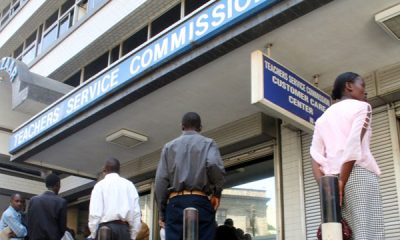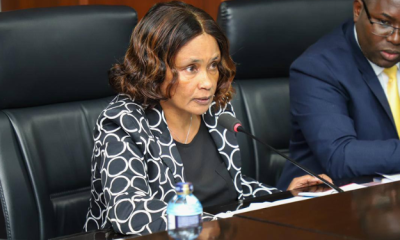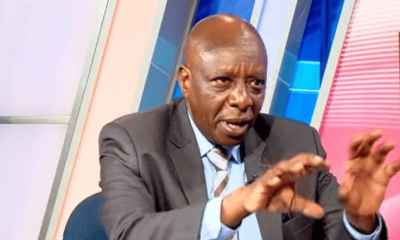News
Health Crisis: SHA Declines To Onboard Teachers
The Minet-administered scheme has drawn sharp criticism from lawmakers, who described it as a “mongrel system” riddled with inefficiencies, delays, and lack of compassion.

The fate of more than 360,000 teachers and their dependents under the Teachers Service Commission (TSC) medical scheme remains in limbo after the Social Health Authority (SHA) declined to absorb them, citing inadequate capacity and prohibitive costs.
Appearing before the National Assembly’s Education Committee, TSC CEO Nancy Macharia revealed that although the government allocated Sh20 billion to the scheme, SHA required Sh37 billion to onboard the teachers—a gap that also hindered the now-defunct National Health Insurance Fund (NHIF) from taking them on.
“This budget deficit has been a consistent obstacle,” said Macharia. “Even last year, when we considered transitioning to SHA, they told us they lacked the necessary infrastructure and needed Sh37 billion. We currently run the scheme with Sh20 billion.”
As a result, TSC renewed a three-year contract with Minet Insurance in December 2022, which runs until November 2025.
The Minet-administered scheme has drawn sharp criticism from lawmakers, who described it as a “mongrel system” riddled with inefficiencies, delays, and lack of compassion.
Igembe North MP Julius Taitum questioned the lack of competition in the tendering process, hinting at a possible monopoly. “Is it that other insurers avoid applying because they know it’s being handled haphazardly, to the detriment of teachers?” he asked.
Teso South MP Mary Emase gave an emotional account of teachers left waiting for hours or denied care due to approval delays. “Some are told they’re pretending to be sick. Teachers at Bungoma Life Care have waited endlessly for approval,” she said.
Committee Chair Julius Melly called the scheme dysfunctional, citing cases such as a teacher being detained at a Nairobi hospital for 90 days over delayed payments. “This scheme has no head or tail. It must be overhauled,” he said.
Macharia blamed delayed government disbursements for many of the issues, saying providers sometimes withdraw services when funds are late.
“If our teachers were to get the best medical care, they would need full insurance coverage. That’s not the case now due to budget constraints,” she said.
Lawmakers urged a complete restructure of the scheme. Melly proposed splitting teachers into clusters handled by different insurers to decentralize services and improve efficiency.
“With Bliss Healthcare as the master capitator, approval processes are overwhelmed,” said Luanda MP Dick Maungu. “Why not break it down into clusters for better management?”
Baringo North MP John Makilap warned that unless drastic changes are made before the contract expires in 2025, teachers will continue to suffer. “This amorphous setup won’t work. We must divide them into cohorts or transition to SHA,” he said.
Taitum called for a full probe into the consortium running the scheme. “Teachers won’t get justice from this setup. We need a full-day interrogation of the service provider.”
Defending the current model, TSC Director of Legal Services Cavin Anyour said the consortium includes top-tier insurers. “Minet leads a group of eight top providers. Those who were left out lacked the capacity to deliver,” he said.
Kenya Insights allows guest blogging, if you want to be published on Kenya’s most authoritative and accurate blog, have an expose, news TIPS, story angles, human interest stories, drop us an email on [email protected] or via Telegram
-

 Business1 week ago
Business1 week agoEastleigh Businessman Accused of Sh296 Million Theft, Money Laundering Scandal
-

 Investigations1 week ago
Investigations1 week agoInside Nairobi Firm Used To Launder Millions From Minnesota Sh39 Billion Fraud
-

 Business1 week ago
Business1 week agoMost Safaricom Customers Feel They’re Being Conned By Their Billing System
-

 News1 week ago
News1 week agoUnfit for Office: The Damning Case Against NCA Boss Maurice Akech as Bodies Pile Up
-

 Business1 week ago
Business1 week agoEXPLOSIVE: BBS Mall Owner Wants Gachagua Reprimanded After Linking Him To Money Laundering, Minnesota Fraud
-

 News1 week ago
News1 week agoTax Payers Could Lose Millions in KWS Sh710 Insurance Tender Scam As Rot in The Agency Gets Exposed Further
-

 News1 week ago
News1 week agoPastor James Irungu Collapses After 79 Hours Into 80-Hour Tree-Hugging Challenge, Rushed to Hospital
-

 News1 week ago
News1 week agoDeath Traps: Nairobi Sitting on a Time Bomb as 85 Per Cent of Buildings Risk Collapse



























